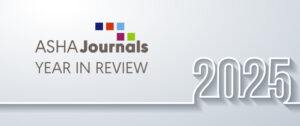ASHA’s Science and Research Programs include several opportunities for students and emerging-to-mid-career scientists to enhance grantmanship: Lessons for Success, Clinical Practice Research Institute, Grant Reviewer Training, and special sessions at the annual Convention focused on funding mechanisms and grantsmanship. One message that resonates throughout these varied programs is that successful applications have several characteristics in common that are essential to receiving support in a competitive funding environment. These characteristics include
- innovation
- creativity
- demonstrable feasibility
- evident institutional support
- a strong sense of scientific context
- highly significant aims
- a full complement of the necessary experienced personnel
- a realistic scope of investigation
Consideration of the varied ways in which applications often go astray is also instructive. Some of the most common weaknesses stem from the failure to
- consider alternative experimental outcomes
- present specific analytic and statistical approaches
- evaluate possible pitfalls and remedies
- provide a balanced consideration of contrasting interpretations
- explicate how the results will influence our understanding of some aspect of human health or otherwise advance science
One of the most common concerns expressed by reviewers is a “lack of a theoretical framework.” Applications that fail to build from a theoretical framework are not likely to be seen as advancing science and may appear naïve. A strong motivation for research is necessarily drawn from a deep understanding of the current state of science and this theoretical framework guides the development of the questions, experimental design and data analysis. Referring back to this framework throughout the application will remind the reviewer that experiments are tightly focused on the overall theoretical objective. It is important to note, as well, that strong, clinically motivated applications are also driven by a clear theoretical framework, which is often focused on the pathophysiology, cognitive models of the underlying disorder, or the mechanism underlying a treatment effect, rather than proposing a straightforward test of a theoretically unmotivated practice. Similarly, the observation that there is a paucity of work in a target area does not, in itself, enhance the theoretical motivation for the work. Without a theoretical framework, even unique opportunities like access to a specific population or a novel data acquisition technique are unlikely to sufficiently impress reviewers. A strong theoretical framework couched in a comprehensive understanding of the current state of the science is crucial to determining which experimental questions are the most important to address and most likely to advance the science.
In motivating the application, investigators are challenged to concisely describe
- the theoretical framework
- the compelling need for the proposed research
- the innovation associated with the planned approach
- the likelihood that the results will have a transformative effect on the line of inquiry
Another common reviewer concern is that applicants are sometimes perceived as being at the wrong career stage for the work they are proposing. For example, an applicant for a large, independent grant who has had little preparatory experience for mounting a large effort is likely to be seen as overambitious or as an unprepared investigator. It is important to understand that no amount of padding in one’s bio (e.g., with manuscripts “in preparation”) can overcome a weak record of data-based publications in respected journals. It is critical that an applicant have a clear understanding of where his/her experience fits in the research career continuum from beginning as a trainee (i.e., pre- or post-doctoral) to becoming an independent investigator. Besides targeting the appropriate funding agency and mechanism for one’s career stage, applicants can also enhance their planned research by involving highly experienced co-investigators and consultants, especially when the investigator lacks training or a published record in the proposed techniques.
Weaknesses like the lack of a theoretical framework or an overambitious proposal leave reviewers without the necessary confidence in the presumed need for the proposed research or in the likelihood of its success. Savvy grantwriters will reassure reviewers by explicitly
- integrating the theoretical framework throughout the proposal
- demonstrating methodological and analytic feasibility
- proposing a realistic scope
- incorporating a fully conceived interpretation of the resultant data
In some cases, an application may be enhanced by illustrative data derived from the planned analytic technique to show that the data can be managed effectively and interpreted unambiguously. A clear formulation of the timeline, management, and required resources will also help new investigators to avoid the common criticism that the plan is “overambitious.”
Applicants should thoroughly familiarize themselves with the Web site of the target funding agency and grant mechanism, drilling down to understand fully the review criteria associated with the target grant program, the application requirements, and even the composition of the review committee. Having read these materials, an excellent next step down the road to grantwriting success is a well-informed conversation with staff at the potential funding agencies.
ASHA’s Science and Research Programs draw from the expertise of grantees who have received funding from a variety of agencies (e.g., National Institutes of Health, National Science Foundation, Department of Education, Veterans Administration) to provide education, mentoring, and guidance on developing a program of research and grantsmanship. For more information on these programs, contact Margaret Rogers, Chief Staff Officer for Science and Research at mrogers@asha.org.










